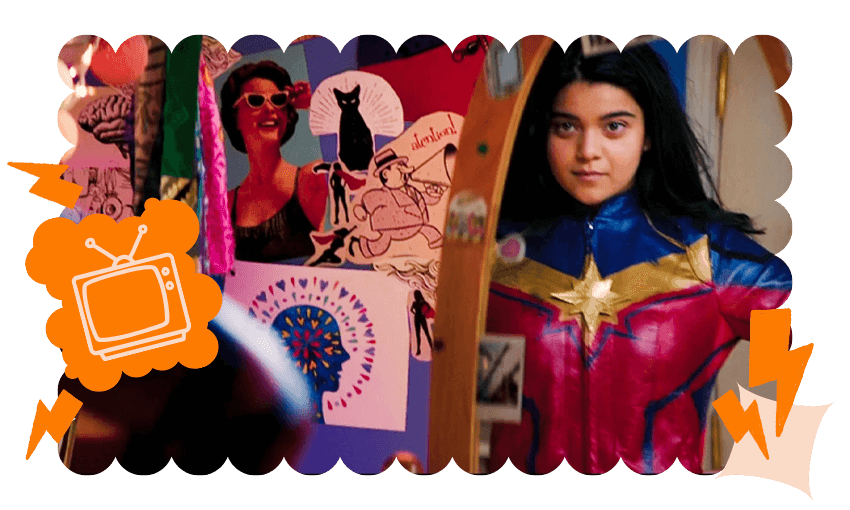The latest Marvel series is a uniquely resonant depiction of the joys, and trauma, of South Asian culture, writes Sapna Samant.
In 1947, with the sun beginning to set on the empire, British lawyer Sir Cyril Radcliffe was given five weeks to create boundaries between a majority Hindu, but secular, India and the new Muslim nation of Pakistan. Radcliffe had never been to India, or even Asia. He had no knowledge of the on-the-ground realities or the culture of the subcontinent that had been a British colony for 300 years. Which is why he was deemed an “impartial” figure who would make an “unbiased” decision on how the border would be drawn.
It is said he arrived, drew random lines through the middle of villages in Punjab and Bengal where people of different religions had co-existed for centuries, contracted Delhi belly, burnt his papers and went home to London.
The subcontinent celebrated independence from Britain at the stroke of midnight on 15 August 1947. Two days later that border between India and Pakistan, known as Radcliffe line, was published, and one of the worst humanitarian crises the world has ever known was unleashed.
As a direct result of the Partition, up to 20 million people were displaced and more than a million people died. The inter-generational trauma continues, including among the diaspora of desis (people from the subcontinent), even if they rarely talk about it.
This year is the 75th anniversary of the Partition, and its lingering effects have been on the minds of people like me even more than usual. That’s why it felt so special when a 16-year-old Pakistani American called Kamala Khan (Iman Vellani) turned up in the new Marvel television show Ms Marvel, embodying the trauma of her ancestors under Partition while discovering her own superpowers.
My grandfather was a GP in Mumbai at that time. I remember him talking about the mayhem; about his Muslim patients, anxious about their safety. One effect of the Partition is that the Mumbai film industry benefited from the Punjabi workers who moved there from Lahore. Meanwhile top star Dilip Kumar stayed behind in Mumbai, imploring his co-star and fellow Muslim, Noor Jehan, to stay back too. But she didn’t, leaving India to move to Karachi, Pakistan. These are just the stories of famous people. Hindu refugees in India and the Muslim muhajirs in Pakistan were all treated badly. That pain is always under the surface and, despite the political vultures constantly pecking at those wounds, the love and exchange of ideas continues.
There’s a trend, especially among younger people, towards an all-encompassing “South Asian-ness” that centres India while erasing the other nations in the subcontinent. But as desis, our history and popular culture is specific, the product of the uniquely interconnected nature of the region. I love that specificity. I am the desi who witnessed that India-Pakistan test cricket series in 1978, Runa Laila singing in Hindi, Urdu and Bengali on the local TV channel in Mumbai, Nazia and Zoheb Hassan dropping ‘Disco Deewane’, and constantly rewinding Hassan Jahangir’s ‘Hawa Hawa’ on audio cassette.
That is why Ms Marvel warms my heart with its very particular representation that nails diaspora desi and subcontinental pop culture. I could be Kamala’s mother, guilt tripping her daughter in that classic passive-aggressive way. Each Friday I watch Ms Marvel with my son. The first week, his eyes turned wide when he saw a young brown girl call her mother Ammi. Because that is what he calls me, and that Ammi was just like his Ammi.
A Pakistani colleague laughed at how Kamala’s parents want her to wear a Hulk cosplay costume made out of a salwar-kameez. That’s what I would’ve said to my daughters, she said. Kamala and her best friend Nakia complaining about the run-down women’s section in the masjid? That’s her experience too. She also has a story about how Partition affected her family.
The world’s biggest superstar, the actor Shah Rukh Khan, plays a role in Ms Marvel – although he doesn’t actually appear on screen. He does not need to be visible. Just the banter between desi kids Kamala and Kamran is enough. Which is SRK’s best role, they argue, enumerating his films. Shah Rukh’s father was born in Peshawar, now in Pakistan.
Most exceptional are the desi songs populating each episode, like a Bollywood film that uses songs to transition or punctuate the action. Notably the first Balochi hijabi female rapper Eva B’s ‘Rozi’ and ‘For Aisha’ by Memba, plus Evan Giia and the Nooran Sisters. I know the lyrics to the 1949 Hindi film classic ‘Tu Mera Chand Main Teri Chandni’ that opens episode five by heart.
Where the depiction of a hunt for treasure in pre-Partition India in Indiana Jones And The Temple Of Doom was an insult to desis, the scene in Ms Marvel of five people of colour digging for a bracelet in the same time and place is magical. Five people from the Noor Dimension who could possibly be djinns.
When I watch Ms Marvel, I’m transported to my own teenage years thinking what superpower I might have developed during happy times. But I was traumatised in 1992-93, when Babri Masjid in Ayodhya was demolished by Hindutva adherents, and the consequent Hindu/Muslim riots and serial bomb blasts across the city put India on a path towards millions more partitions. Inspired by young Kamala, I believe that resisting the hate that is spreading across India will become my superpower.

